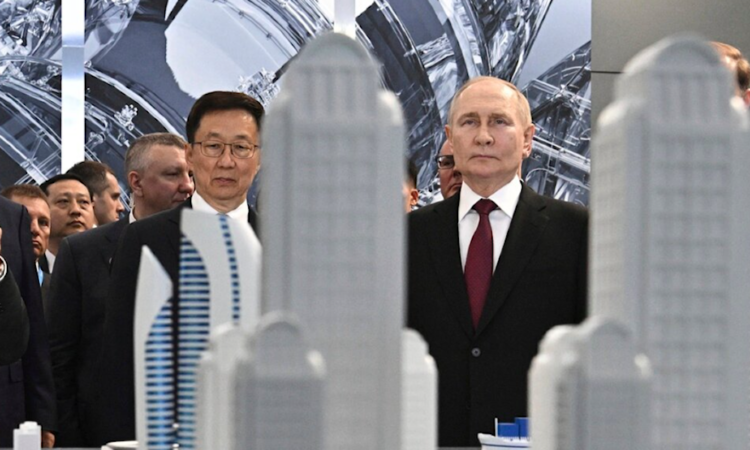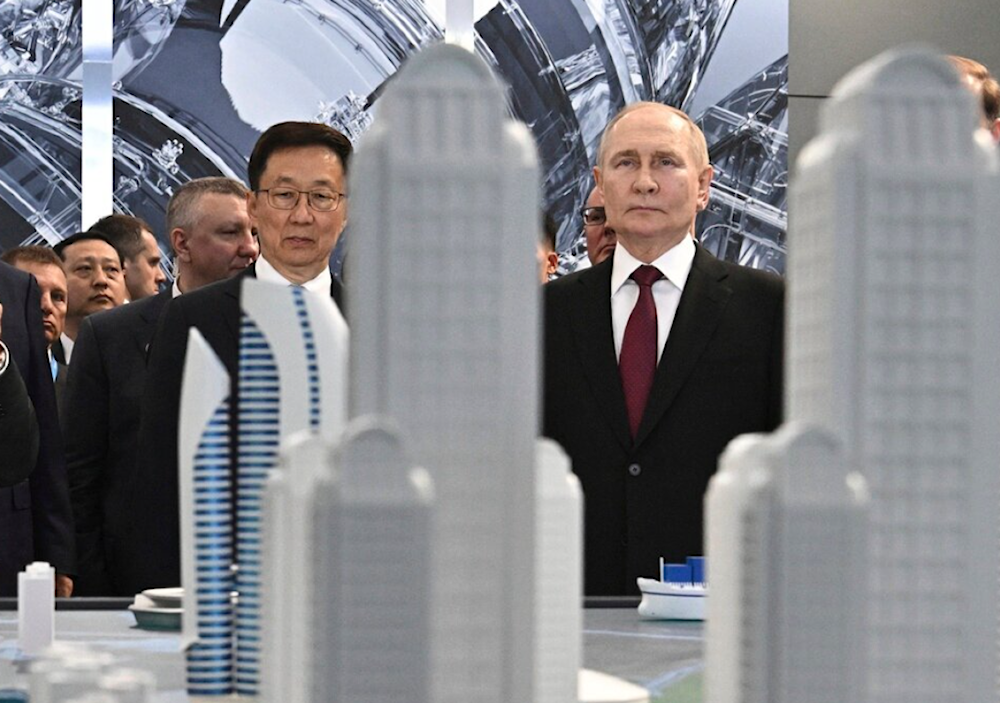
According to economists, the economies of the United Kingdom, Germany, and France would suffer the most if their trade connections were severed, with no possibility of parallel imports.
-

Russian President Vladimir Putin, right, and Chinese Vice President Han Zheng, left, visit the Russian-Chinese EXPO in Harbin, northeastern China’s Heilongjiang Province, on Friday, May 17, 2024. (Kremlin pool via AP)
The US, Russian, and Chinese economies could withstand a full trade blockade with little damage, whereas Germany, France, and the United Kingdom would suffer greatly under the same scenario, a study conducted by the Sino-Russian Laboratory for Assessing the Consequences of Intercountry Trade Wars revealed.
The analysis, which was done in early 2024 at China’s National Supercomputing Center, used mathematical modeling to assess the resilience of 19 world economies to large-scale economic sanctions. Analysts calculated the direct gross domestic product (GDP) losses that each country would experience if faced with a total trade blockade without the option of parallel imports.
The analysis found that while all nations’ economies would collapse under the suggested scenario, some would suffer more than others. Russia would be one of the three most resilient, with its GDP contracting by no more than 3.5%. China’s GDP would fall by 3.1%, while the US would suffer a 2.3% dip.
If trade links were severed, the German economy would experience the biggest damage, shrinking by 8.1%. South Korea (down 7.9%), Mexico (7.2%), France (7%), Turkey (6.6%), Italy (6.0%), and the United Kingdom (5.7%) would all suffer significant losses.
The research also revealed that the economies of Australia, Indonesia, and Japan would contract by 3.7-3.8%, making them less vulnerable than India, Brazil, and Canada, which would see GDP drops of more than 4%.
Stanislav Murashov, Chief Economist of Raiffeisenbank, commented on the findings, stating that when faced with economic constraints, the least impacted countries will be the most equipped, such as the US, China, and Russia, thanks to their Composite Index of National Capability, which is their increased natural resources and human and scientific development.
Murashov told Kommersant news that countries who ‘win’ in this situation are those who localize their production and may “abandon some imported components, parts, raw materials, equipment,” adding that the findings may suggest China, the US, and Russia are less reliant on the global market than Europe is.
Official figures show that the Russian economy, although under various Western sanctions for the war in Ukraine, grew by 3.6% last year. In 2024, estimates indicated that the nation’s GDP increased by 5.4% year on year in Q1 of 2024.
The International Monetary Fund predicted last month that the Russian economy will grow 3.2% this year, putting it ahead of a number of major Western nations, including the United States (2.7%), the United Kingdom (0.5%), France (0.7%), and Germany (0.2%).
China, Russia to continue adhering to non-alignment principle: Beijing
Russian President Vladimir Putin was in the northeastern Chinese city of Harbin on Friday, the final day of a visit aiming to enhance the economic relationship between the two countries.
Putin arrived Thursday on his first trip abroad since his March re-election, meeting with President Xi Jinping for talks in which the leaders described their nations’ ties as a stabilizing force in a chaotic world.
Since the start of the war in Ukraine and the imposition of Western sanctions on Russia, its trade with China boomed, hitting $240 billion in 2023, according to Chinese customs figures.
The Financial Times on Tuesday published an op-ed detailing that Russian President Vladimir Putin’s upcoming trip to Beijing might signal a significant shift in perceptions of Western economic threats. It posits that Putin’s visit to Beijing could serve as a testament to the resilience of Russo-Chinese cooperation in the face of US sanctions.
Since February 2022, Beijing has become Russia’s largest market for oil and gas, as well as a major source of imports.
Alarmed by this partnership, the White House in December 2023 threatened sanctions on any bank facilitating payments for Russian military equipment.
US Treasury Secretary Janet Yellen and Secretary of State Antony Blinken made separate visits to China earlier this year, issuing warnings to Chinese leaders and financial institutions.
Despite these threats, both the Russian and Chinese governments have shown remarkable resilience. Putin’s visit presents a new opportunity to discuss the creation of an alternative global financial market.






